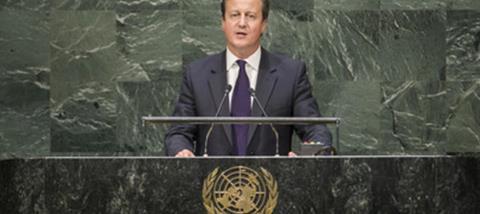
This Saturday, the United Nations turns 70 years old. The organisation was established on the 24th October 1945 following the Second World War, to prevent another such conflict. There have been enormous successes and the United Nations must claim some credit for the not insignificant fact that there has been no World War Three. The usefulness of such daughter organisations as UNHCR (United Nations High Commissioner for Refugees, responsible for at least 13 million refugees), UNICEF (United Nations Children’s Fund) and UNDP (United Nations Development Programme) should also be applauded.
There have, however, been some disappointments. So, for example, as a Greek Cypriot, I am all too familiar with the UN’s role in intervening between the Greek and Turkish Cypriot communities. The UN sent troops to Cyprus in 1964 and, sad to say, half a century later they are still there! There, as in many other areas, the UN may have prevented war but hasn’t yet brought peace.
Most of us recognise that the world is a mess and we welcome those who are prepared to act as policemen in some very unpleasant places. The fact that well over 3000 UN peacekeepers have been killed in the line of duty should give us pause for thought. Yes, it’s a bureaucratic organisation but it’s hardly unique in that. Serious criticism of the UN is normally reserved for those occasions when, like the referee at a football match, it doesn’t deliver the verdict that we want. It’s worth remembering that in 2003 the United Nations Security Council refused to back the demands of the United States and Britain that force be used to disarm Iraq. It was ignored, but the tragic and appalling mess that has followed in Iraq since then suggests that the UN had a point.
In assessing the work of the United Nations I am helped by reminding myself that the Bible gives guidance concerning how we should live by reference to three things: what we were; what we are to do now; and what we will be. What we were refers to the first chapters of Genesis of humanity before our rebellion against God. What we are to do refers to those laws and rules in the Old and the New Testament, especially the Ten Commandments and the Sermon on the Mount. What we will be is often overlooked but is conveyed by those numerous verses in the Bible of what the state of things will be after the return of Christ. If you put together verses in Isaiah (2:2-5; 9:2-7; 11:6-9 and chapters 56–66) along with the book of Revelation (7:15-17 and chapters 21–22) we get some remarkable statements of what the final destiny of the universe will be. There we are told that the world will be a healed place of justice, free from suffering and where ‘the nations’ are at peace with each other.
It is clear in the New Testament that this happy state is not going to be reached completely until the return of Christ. However, the road between here and there is going to be pretty rough at times. Nevertheless, the sort of things that God intends for the universe in the future are well worth working for now. So the peace, justice and harmony between nations that are the goals of the United Nations are things to support now. We should be under no illusions that any form of United Nations, present or future, will completely deliver these things, but we know what God wants and what, in his own time, he will bring about.
The UN is in constant need of supervision and reform. But we also recognise that, in a world where evil people and nations have extraordinary power, something like the United Nations is always going to be necessary to protect the weak. In fact, when I think of the UN I am helped by taking those two letters as a reminder of the word UNTIL. It’s that word that gives us the correct perspective. Until Christ returns we will need the United Nations. But, thank God, we will have no need of it afterwards.
For more from J.John, visit www.canonjjohn.com
To receive a free copy of Premier Christianity magazine click here


























